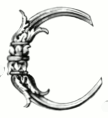In transcribing the following paragraphs from the Internet Archive online version of The Imperial Gazetteer’s entry on Egypt I have divided the long entry into separate documents, expanded abbreviations for easier reading, and added paragraphing and links to material in the Victorian Web. Unless otherwise noted, illustrations come from the original Gazetteer. — George P. Landow

opts, the Christian descendants of the most ancient inhabitants of Egypt, mingled, in some degree, with the Greeks, Nubians, Persians, and Abyssinians ; but kept en tirely separate, by religious antipathies, from the Arabian and Turkish invaders. They prove their antique origin by the striking resemblance of their features to the paintings and sculptures on their ancient temples, and even to the mummies which are still preserved. Their characteristic features are dark half woolly hair, a flat forehead, small dark eyes, high cheeks, a short and somewhat elevated nose, large mouth,, with thick lips, and a scanty beard.
They have continued to profess Christianity, but have separated from the Greek church, and profess the tenets of the Eutychean sect. The Coptic language is now understood by few persons, and the Arabic being adopted in its stead, it may be considered a dead language. The Copts were at one time far more numerous than at present; they do not now compose more than one-fourteenth part of the population of Egypt, their number not exceeding 150,000, about 10,000 of whom reside at Cairo. They are distinguished by wearing a turban of black or blue, or a grayish or light brown colour, in contradistinction to the red or white turban. The Coptic era reckons from the persecution of Diocletian, called the Era of Martyrs, or from August 29, A.D, 284.
Bibliography
Blackie, Walker Graham. The Imperial Gazetteer: A General Dictionary of Geography, Physical, Political, Statistical and Descriptive. 4 vols. London: Blackie & Son, 1856. Internet Archive. Inline version of a copy in the University of California Library. Web. 31 July 2020.
Last modified 3 August 2020